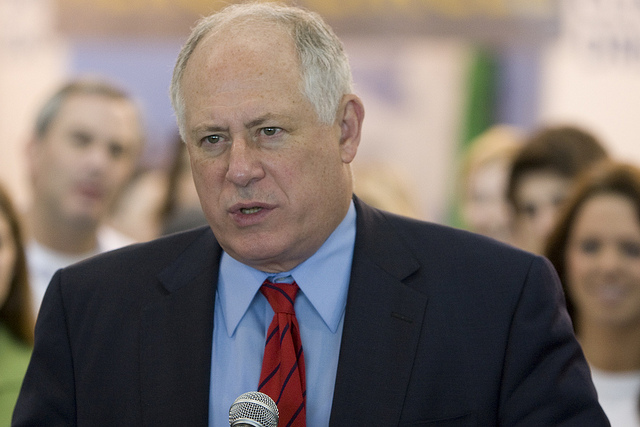A New Jersey court ruled last month that the state acted illegally in cutting its pension contributions over the last two years.
As a result, the state will need to pay its full contribution in 2015 – which means New Jersey will need to come up with about $1.6 billion that hasn’t yet been budgeted for.
In lawmakers’ search for new streams of revenue, one idea has come to the forefront.
New Jersey Senate President Stephen Sweeney is proposing a tax on millionaires.
The policy would boost the income tax on earnings over $1 million and could raise $600 million in revenue in its first year, but Gov. Chris Christie has historically been opposed to the measure.
More from NJ Spotlight:
Senate President Stephen Sweeney (D-Gloucester) said [a millionaire’s tax] would help the state make “a good-faith effort” while giving public-worker unions an incentive to cooperate with government to make benefits more affordable.
“In my mind that means a millionaires tax, it really does,” Sweeney said in an interview with NJ Spotlight.
Though a bill hasn’t been crafted yet, he envisions something similar to the legislation lawmakers sent Christie last year that would have temporarily upped the income-tax rate on earnings over $1 million from 8.97 percent to 10.75 percent.
[…]
According to the Tax Foundation, a Washington, D.C.-based organization that tracks state tax policies, New Jersey’s 8.97 percent top-end income tax rate is the sixth-highest in the country, behind California, 13.3 percent; Hawaii, 11 percent; Oregon, 9.9 percent; Minnesota, 9.85 percent; and Iowa, 8.98 percent.
[…]
The New Jersey Office of Legislative Services, the nonpartisan research wing of the state Legislature, said last year when it analyzed Sweeney’s proposal that boosting the top-end rate on earnings over $1 million would generate an estimated $580 million to $615 million in the first year.
Another concern Christie raised last week was that increasing the tax rate on millionaires could send more of them packing to states that already offer lower income tax rates, or levy no income tax at all.
That’s because the top 1 percent of tax filers typically cover roughly 40 percent of the total income tax haul for New Jersey, according to Department of Treasury figures…
It’s likely that the majority of New Jersey residents would be supportive of a millionaire’s tax. In a 2014 poll by Monmouth University’s Polling Institute, 66 percent of residents said they supported a tax on high earners, with revenue going toward pension contributions.
Photo credit: “New Jersey State House” by Marion Touvel – http://en.wikipedia.org/wiki/Image:New_Jersey_State_House.jpg. Licensed under Public domain via Wikimedia Commons – http://commons.wikimedia.org/wiki/File:New_Jersey_State_House.jpg#mediaviewer/File:New_Jersey_State_House.jpg





